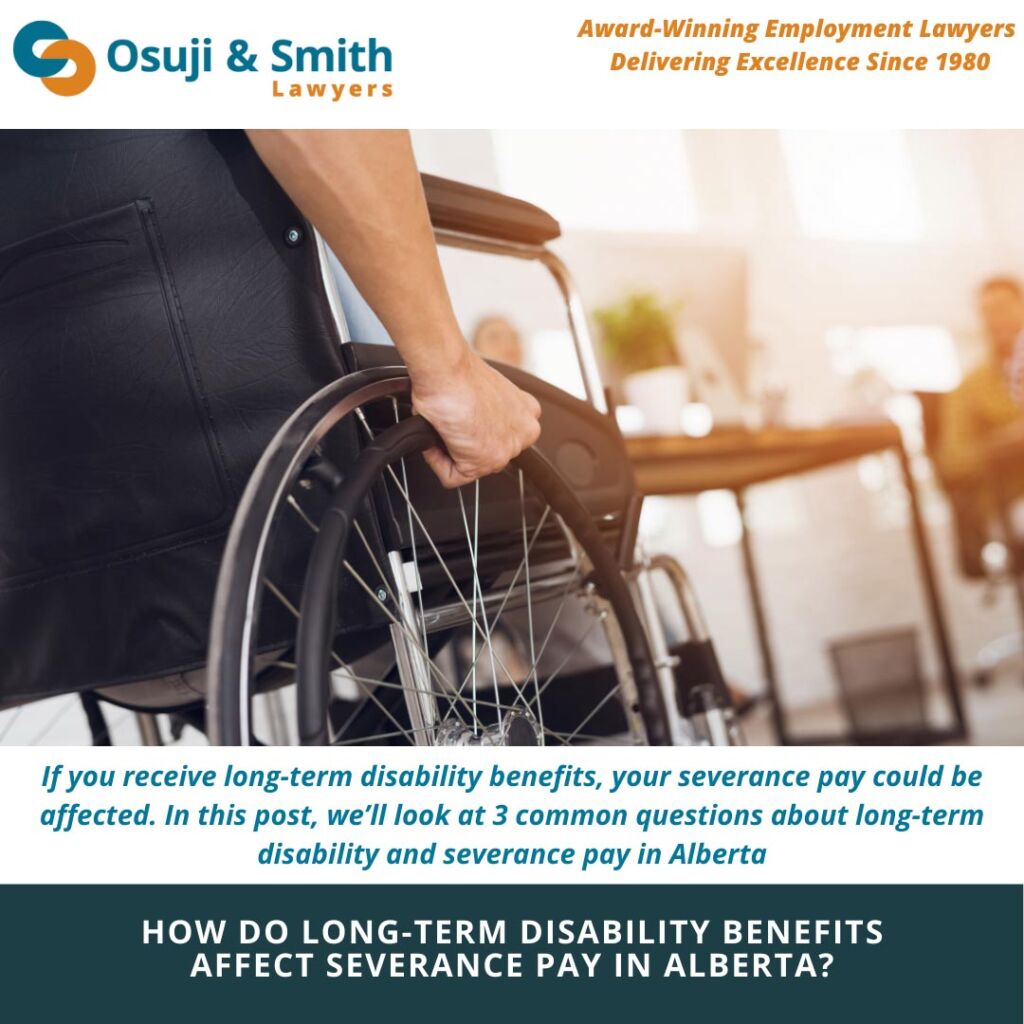How do LONG-TERM DISABILITY BENEFITS affect SEVERANCE PAY IN ALBERTA?
If you receive long-term disability benefits, your severance pay could be affected. In this post, we’ll look at 3 common questions about long-term disability and severance pay in Alberta:
- What does Alberta law say about severance pay?
- How is severance pay calculated in Alberta?
- How do long-term disability benefits affect severance pay?
What does Alberta law say about severance pay?

Common law and the Employment Standards Code govern severance pay in Alberta. The Code states that severance pay (also called termination pay) is mandatory in Alberta when an employee who has worked for the company for longer than 3 months is terminated without cause and without reasonable notice.
Reasonable notice is advance notice of your job termination. The length of reasonable notice depends on the length of your employment with the company. It ranges from 1 week (for employees who were employed for less than 2 years) to 8 weeks (for employees who were employed for 10 or more years).
If your employer fires you without cause, they are legally required to give you reasonable notice. If they want you to stop work immediately, they must pay you for the time of the notice period. This is called “severance pay in lieu of notice”.
If you were terminated without cause and were not given reasonable notice, you may be a victim of wrongful dismissal and are likely entitled to severance pay.
How is severance pay calculated in Alberta?
The Employment Standards Code sets minimum severance pay amounts based on the length of your employment as follows:
- Employees who worked at least 3 months are entitled to 1 week’s pay
- Employees who worked over 12 months are entitled to 2 weeks’ pay
- Employees who worked over 3 years are entitled to 3 weeks’ pay
- Every additional year of employment up to 8 years entitles the employee to an additional week’s pay (i.e. 4 years employment = 4 weeks’ pay, 6 years employment = 6 weeks’ pay, etc.).
To calculate the minimum severance pay (or termination pay) you’re entitled to in actual dollars, first calculate one week’s pay.
- Calculate your total wages, excluding overtime, over 8 weeks.
- Divide that total by 8.
Your answer gives you the amount of 1 week’s severance pay. For example, if your total wages over 8 weeks were $12,000, your calculation would look like this:
$12,000/8 = $1,500
So, one week’s pay in this scenario is $1,500.
If you’re entitled to more than 1 week’s pay, simply multiply 1 week’s pay by the number of weeks you’re entitled to. This is the minimum amount of severance pay you’re entitled to.
For example, if you’re entitled to 5 weeks’ pay, using the above scenario, the calculation looks like this:
$1,500 x 5 = $7,500
In this case, you would be entitled to a minimum of $7,500 severance pay according to the minimums set by the Code.
However, some employers offer a more generous severance package, which should be detailed in your employment contract. There are also other factors, such as vulnerabilities like pregnancy, disability, or age, that may entitle you to more severance pay.
How do long-term disability benefits affect severance pay?
Your long-term disability benefits policy and your employment contract both determine how your long-term disability (LTD) benefits affect your severance pay.
Employment contracts commonly state that your long-term disability benefits will stop at the time of termination. Your LTD benefits are considered an employment benefit, not a part of your severance package.
Your long-term disability policy specifies the amount you receive if you become unable to work because of a medical condition. However, most LTD policies also state that certain types of income may be deducted from the amount of your benefits, and insurance companies often try to reduce your benefits by considering your severance pay income that offsets those benefits.
Some employees may be entitled to fully claim both LTD benefits and severance pay, but the language of your LTD policy and your employment contract are crucial for determining the amount you’re entitled to for both. The Courts look at the language for clarity of intention, rights, obligations, and enforceability.
History shows that the Courts rule in favour of the employee in cases about long-term disability benefits and severance pay, but each case is decided on an individual basis.
Are you receiving the benefits and severance pay you’re entitled to?
Most people think strictly of the length of employment when determining if they got a fair severance package. This is insufficient and often results in an employee receiving far less than they’re entitled to. There are many variables and each situation is decided individually.
It’s important to consult with an employment lawyer who will review your long-term disability benefits policy and your employment contract to determine how your benefits may affect your severance pay.
Remember that you may be entitled to more than the minimums required by Alberta’s Employment Standards Code, and the language in your policy and contract significantly affect your entitlement. Because each situation depends on various factors, an experienced employment lawyer can advise you on your specific situation.
The dedicated team of award-winning lawyers at Osuji & Smith are accustomed to battling through long-term disability and severance pay cases. Our Calgary employment lawyers can also determine if you may have been wrongfully dismissed.
Don’t settle for less with long-term disability benefits and severance pay! Consult with an Osuji & Smith employment lawyer today.

